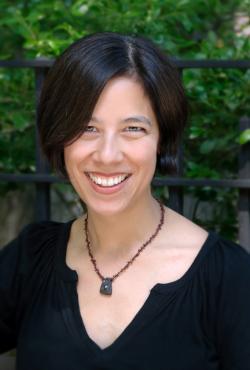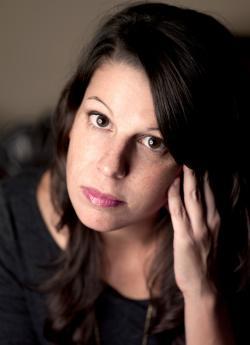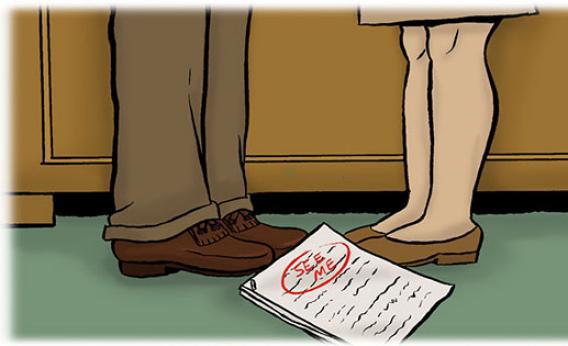For a long time now, I’ve been wondering if I should be insulted that not one of my university professors ever hit on me. I try to avoid the usual feminine self-questioning about attractiveness and intelligence; instead, I tell myself that I went to a large public university in an urban setting, and that tiny arts colleges are better soil for that sort of thing. But my school did have its share of professors rumored to dabble in their students. One, I recently discovered, actually wrote a memoir in which he blithely described meeting his second wife in a graduate class there. Clearly it wasn’t the setting that released me from cliché.
Such relationships are not necessarily seedy, predatory things. But even when the encounters involve intellectual equals, they give off a sour smell. Hannah Arendt and Martin Heidegger had an affair when they were in Germany together, the former as a student of the latter. It looks, at first glance, like a great collision of brilliant minds. Except that Heidegger became a Nazi, and Arendt seemed to excuse this—a bit of forgiveness that has inspired a lot of scholarly infighting about whether she was lovesick or in some way morally compromised herself. That she could have been internally conflicted does not seem to be an available interpretation.
The professor-student romance debate similarly breaks down, for the most part, to two opposing views. In one corner you have your Roiphes and your Paglias, who style themselves as revolutionaries for celebrating the power dynamics of the status quo. In the other you have feminists more aligned with Andrea Dworkin who seem to believe one can remove power from relationships entirely. Were these indeed the only two options, we might all be walking into the river with stones in our pockets. But there are other ways to think about these things. And were you to ask me how, I would say: with novels, with fiction, with stories. Stories can provide sympathy and psychological complexity—without ignoring the ways in which power curbs a relationship.

Photo courtesy of Adrian Kinloch
And so it is worth considering what, if anything, two new novels have to say on the subject. Susan Choi’s fourth novel, My Education, and Jessica Lott’s first, The Rest of Us, both depict teacher-student relationships. In Choi’s, a student named Regina ends up tangled in the deteriorating marriage of two brilliant scholars, Nicholas and Martha. In Lott’s, the student-professor couple reunite many years on. They are, for the most part, very different books. Choi’s is, not surprisingly, the far more accomplished of the two. But they have one rather telling similarity: Both books seem ultimately uncomfortable with the very subject they have taken on—as though their authors are ultimately unwilling to confront the thicket of moral issues such relationships raise.
Both Choi and Lott tweak their premises like lawyers, as though trying to distinguish their case from precedent. They appear to have made a deliberate choice to get away from the standard Oleanna scenario, away from that moralizing term “sexual harassment.” Neither author makes her protagonist the actual student, in the literal sense, of her lover. Terry, the student in Lott’s book, only audited a class by her eventual lover Rhinehart, a famous poet and professor. Choi’s Regina becomes involved with her professor’s wife, Martha, who is herself an academic. (This bait and switch happens barely 60 pages in; I haven’t spoiled anything.)
Yet the dynamic in each relationship is unquestionably pedagogical. Terry is plainly in awe of Rhinehart throughout the book—a state she is either unaware of or her creator chooses not to analyze, it’s hard to say which. Choi, meanwhile, is perfectly frank about this with her title: My Education. She knows that Regina loved Martha “from such desperate disadvantage.” And she devotes the bulk of the novel to the affair itself. Most of its descriptive passages are about the torrid sex the protagonist is having, beds always being swampy and scented, and showers fraught with erotic peril:
“My eager efficiency in the shower was blunted somewhat, as if encountering head wind, by the enveloping recollection of the shower we’d taken the previous night, when we’d come in by stealth at some hour past one in the morning. We liked to make love very clean and go to sleep very dirty, sweat-enmatted and pungently syrup-adhered. Now back in the shower my attempts to self-cleanse became counterproductive, as my hand dropped the soap while one cheek squashed against the cool tile, and I muffled a groan that emerged like a gurgle and, though standing, almost drowned myself.”
My Education is all sensibility, not sense.
Despite the evident frankness about sex, though, Regina sidesteps any question of exploitation. She seems to blame her own immaturity for her suffering during the affair. Toward the end of the book, in a wiser moment, she describes moving away from the sultry, sex-haze model of romance as “a trading of the murky infinite for the well-lit and limited.” She is proud of this achievement. “Reader, I grew up,” she says. This claim is promptly undermined when Regina joyfully and maturely reunites with Martha 14 years on.
Lott, meanwhile, is more of an old-school romantic, curiously chaste but nonetheless prepared to let sentiment substitute for convincing feeling. Things kick off for her Pulitzer-winning poet and his undergraduate lover in a moment of reunion, 10 years down the line. The book then crescendos into a kind of updated, creative-class Love Story whose pretensions to romance feel very cheaply bought indeed. When something threatens to thwart the grand romance, Terry makes a confession to Rhinehart.
“I told him about how when I was in college I used to watch for him to come home, and then jump into a chair to make it appear I’d been doing other things, about these visions I had that took place at my elementary school and in them I was a child, and he was coming around the corner to pick me up. They were so bizarre I’d never told him. I said that with him I’d felt protected. I felt understood, as if he could see deep into what I needed, before I could even.”
These musings are meant to be romantic, and the book doesn’t face the awkward questions they raise. Why a fantasy about elementary school? What is it we want from lovers who know what we “need” better than we do?

Photo courtesy of Graham Lott
If one party is always a teacher, and the other a student, in a relationship, then someone has the upper hand. That someone is Henry Higgins to his Eliza. Both Choi and Lott are coy on this point. It is out of vogue to talk about power and its uses in any direct way, so they don’t. And funnily enough, it is the silence about that dynamic that, more than anything, brings out the frustrated Puritan in women who look from afar upon these relationships. Like me, reading these books, thinking about the stories I used to hear of the professors who harvested the undergraduates each fall, remembering how prudish it felt to observe the predictable cliché of it all.
Of course, all love has an element of worship, and worshipper and worshipee are not unlike student and teacher. But the gold standards of romance, those beloved 19th-century novels, understood that the worship isn’t always deserved, and provokes suffering. Think of Colonel Brandon waiting at a respectful distance for Marianne Dashwood in Sense and Sensibility. (It helps to lean on Alan Rickman’s heavy-lidded interpretation here.) Think of how Jane Eyre resolves to deal with Mr. Rochester’s deceit: “Not a human being that ever lived could wish to be loved better than I was loved; and him who thus loved me I absolutely worshipped: and I must renounce love and idol.”
So it’s curious to find that in The Rest of Us and My Education, the renunciation of the teacher-idol never happens. Terry and Rhinehart do not live happily ever after, but neither does Terry begin to see his faults clearly. Regina and Martha are able to treat each other more maturely because of the passage of years—and so the reader is robbed of the chance to say to Martha: “My God, what were you thinking?” And never mind the reader—rebellion doesn’t seem to be an option even for the students, either. They remain simple receptors of the teacher’s message in the end. All faults are the students’ own; they were the ones with growing up to do.
Both books, then, ignore the crucial emotional experience of resenting the person who made you worship them when you were young and impressionable. As one should, by the way. Even Arendt, that old apologist, finished up a late tribute to her ex by noting that, “We who wish to honor the thinkers, even if our own residence lies in the midst of the world, can hardly help finding it striking and perhaps exasperating that Plato and Heidegger, when they entered into human affairs, turned to tyrants and Führers.” It’s not just a matter of knowing better. It’s a matter, as Austen and the Brontës knew, of not making people into gods. You can have a mentor without believing that they are perfection itself.
—
My Education by Susan Choi. Viking.
The Rest of Us by Jessica Lott. Simon & Schuster.
See all the pieces in this month’s Slate Book Review.
Sign up for the Slate Book Review monthly newsletter.
